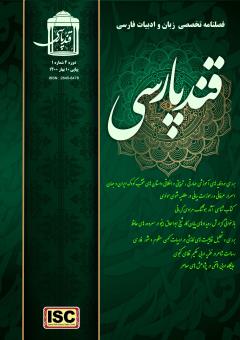بازخوانی گزارش رویدادهای پایان کار شاهشیخابواسحاقاینجو در سرودههای حافظ
محورهای موضوعی : Analysis of order textsعلی محمدی 1 , امیرافشین فرهادیان 2
1 - دانشگاه بوعلی سینا همدان
2 - دانشگاه بوعلیسینا همدان
کلید واژه: ابواسحاقاینجو امیرمبارزالدین حافظ گزارهی تاریخمحور بازتاب رویداد تاریخی,
چکیده مقاله :
رویکرد تاریخی-سیاسی به سرودههای حافظ، افق معنایی جدیدی در ساحت تفسیر دیوان وی گشوده است. در پرتو این رویکرد، بسیاری از دشواریهای شعر حافظ، توضیح داده شده، ضعف ارتباط عمودی بیتها در غزل تا حد چشمگیری از میان رفته و شناخت ما از وجوه شخصیت حافظ و از شعر او دقیقتر شده است. امروز میدانیم که حافظ بر خلاف اغلب شاعران کلاسیک، از شعر به عنوان ابزاری برای بیان نظر و تبیین موضع خود در قبال رویدادهای سیاسی و بازیگران آن عرصه، بهره جسته است. در این میان، حوادث پایان سلطنت شاهشیخابواسحاقاینجو، به دلیل تاثیر عمیق این واقعه بر حافظ و تغییر مسیر زندگانی او، از جایگاه ویژهای برخوردار است. این رویدادها که با تصرف شیراز به دست امیرمبارزالدینمظفری، در سوم شوال ۷۵۴، آغاز گردید؛ پس از یک سلسلهی طولانی جنگ و گریز، سرانجام با گرفتاری و اعدام شاهابواسحاق، در ۲۲ جمادی الاول سال ۷۵۷، پایان پذیرفت. حافظ به دلیل دوستی و تعلق خاطر شدید به ابواسحاق و از سوی دیگر نفرت و بیزاری از مبارزالدین، عمیقاً از دگرگونی رخداده، متأثر شد. شمار قابل ملاحظهای از سرودههای وی، در پیوند با رخدادهای این مقطع از تاریخ است که در این جستار، مورد بررسی قرار میگیرند.
No text, as a phenomenon, is free from the influence of external elements, and without a doubt, social and political events are among the most important and effective external factors. The historical approach to Hafiz's poetry, although less well known, can help to understand many of the difficult, ambiguous, and seemingly scattered aspects of his poetry, relying on recorded historical facts. Among the important historical events of Hafiz's era, the events of the end of the reign of Shah Sheikh Abu Ishaq Inju, due to its profound impact on Hafiz and the change in his life path, have a special place. There was a deep friendship between Hafez and Shah Abu Ishaq, who was a chivalrous and lavish and who respected the people of grace and art, and his reign over Shiraz was one of the best days of Hafez's life. After the defeat of Shah Inju by Amir Mobarez al-Din Mohammad Mozaffari, the page of the time suddenly returned and the poet's dark days came. Undoubtedly, this change and the revolution of the time had a strong reflection in Hafez's poems, which used poetry as a tool to express ideas, positions, and even struggles. Hafez scholars who have reflected the political and historical events of HafIz's time in his works have considered a total of 50 lyric poems to be related to the end of Abu Ishaq's work. We have arranged these poems in order of utilization of the consensus of researchers, from the highest to the lowest, and after confronting each other, we have analyzed the opinions of each and its correspondence with the recorded historical events of that time.
